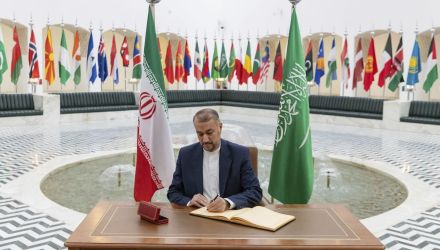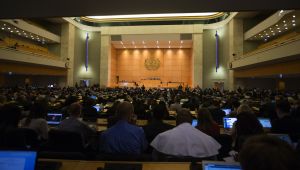BEIRUT -- When President Barack Obama spoke at the US Military Academy recently, and provided a preview of his administration's first national security strategy, he stressed several themes that should be welcomed by the rest of the world. The new strategy emphasizes international diplomacy and alliance-building over the George W. Bush doctrine of pre-emptive war and unilateral action. The big test will come as the world watches to see if the United States actually practices what it preaches, and implements policies that reflect its rhetoric. The first 16 months of the Obama era provide mixed results in this respect.
If the United States pursues its national security interests by doing what the strategy document says it will do -- strengthen old alliances and build new partnerships, shape stronger international standards and institutions, invigorate diplomatic engagement, strengthen international development, and promote democracy and human rights -- it will find itself embraced around the world. If it speaks nicely but behaves roughly, it will only generate more criticism and, as we have seen in recent years, active resistance against it and its allies.
The war in Iraq is the most dramatic recent example of how US policy translates into realities on the ground, whether large-scale death and destruction, massive refugee flows, wasted trillions of dollars, or new and unpredictable forms of political instability. Less flamboyant but equally harmful is the long American tradition of supporting corrupt and autocratic regimes around the world. The strategy document speaks in abstracts and principles; the application of US power has real, serious impact.
President Obama came into office 16 months ago pledging new directions in foreign policy, especially in relations with Muslim-majority countries. He has moved forcefully in some areas (Arab-Israeli diplomacy) but less impressively in others (negotiating with Iran). If we take his January 2009 rhetoric on US-Islamic world relations and measure it today against his actions, we find that the core tensions in US policy in the Middle East remain riddled with contradictions and disparities that largely denude his rhetoric from any meaningful credibility.
Part of this is occupational hazard. Any world power of such magnitude cannot easily apply fine principles to conditions on the ground in all cases. It will make compromises and adjustments as the realities of each situation demand. Yet part of the gap between the US' rhetoric and its actions is the result of a deadly combination of insincerity and vulnerability to special interests and domestic lobbies and politics. This is most evident in the case of American diplomacy in the Middle East region, where active pro-Israeli lobbies in Washington and the absence of serious Arab or Iranian influence leaves Obama's rhetoric dangerously vulnerable to being undercut by the gap between even-handed rhetoric and one-sided behavior.
As the United States in many cases speaks nicely but acts incongruously, it loses both respect and the practical capacity to influence events around the world. The shift in strategy that has been articulated this week is partly a unilateral American response to the efficacy of its recent policies, and partly a realistic response to its realization that it can no longer try to lay down and enforce the law for the rest of the world, as George W. Bush seemed intent on doing.
It is interesting in this respect to observe last week, while Obama issues his new national security strategy, how the United States is forced increasingly to come to terms with the limits of its own vast power. The Turkish-Brazilian mediation with Iran is a case in point, as it shows the need to consult neighboring states in the ongoing diplomacy related to the Koreas, Afghanistan and Iraq. President Obama seems to give more importance to his rhetoric than George W. Bush did, so it is likely that the heartening tone of the new strategic doctrine may be translated into policies in many cases.
A lingering danger in the US national security strategy is Washington's tendency to preach to the world, as in Obama's statement last week that, "America has not succeeded by stepping out of the currents of cooperation. We have succeeded by steering those currents in the direction of liberty and justice, so nations thrive by meeting their responsibilities, and face consequences when they don't."
That sounds reasonable enough, but is the United States setting itself up as the arbiter of which nations promote liberty and justice, and which do not? We will discover in the years ahead. In the meantime, the American ship of foreign policy indicates that it may be slowly changing course towards a more reasonable and realistic approach to the rest of the world. The world will welcome this -- if it actually happens. Much skepticism prevails, however, because of Washington's mixed track record, including during Obama's first 16 months.
Rami G. Khouri is Editor-at-large of The Daily Star, and Director of the Issam Fares Institute for Public Policy and International Affairs at the American University of Beirut, in Beirut, Lebanon.
Khouri, Rami. “US National Security and Global Concern.” Agence Global, May 31, 2010




